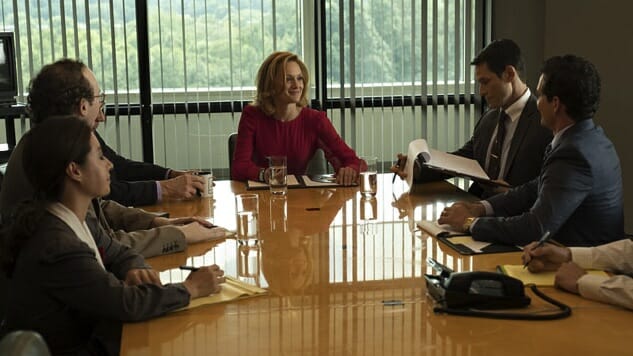Paste‘s TV Power Rankings
Week of 10/16/17
Photo: Bob Mahoney/AMC
It’s been two and a half years since the last installment of the Paste TV Power Rankings. We can only imagine you’ve spent that time wandering in a television desert, relying on Xfinity’s recommendations or, god forbid, flipping channels. Okay, nobody really flips channels anymore, but we do hope this makes it easier to see what great new show you might be missing.
The rules are simple: any series on TV qualifies, whether it’s a comedy, drama, news program, animated series, variety show or sports event. It can be on a network, basic cable, premium channel, Netflix, Amazon, Hulu, YouTube or whatever you can stream on your smart TV, as long as a new episode was made available the previous week or upcoming week—or, in the case of shows released all at once, it has to have been released within as many weeks as episodes are available (10 weeks for a 10-episode series).
The voting panel is comprised of Paste editors and TV writers with a pretty broad range of tastes. We’re merciless: a bad episode can knock you right off this list, as much good TV is available right now.
Honorable Mentions:
American Vandal, Brooklyn Nine-Nine, Curb Your Enthusiasm, Ghosted, The Last Man on Earth, Mindhunter, Nathan For You, One Mississippi, Star Trek Discovery, The Vietnam War
10. Mr. Robot
Network: FX
In its first season, talk of Mr. Robot was like one of those computer viruses its protagonist slipped into the zeitgeist; you heard whisperings of this new show that must have been only broadcast in an abandoned warehouse downtown. Soon it was completely unavoidable—break down and watch the pilot that was floating around the Internet or have your cousin who’s an occasionally employed network engineer write you off for good. But there was substance to the hype. It was tremendously fun to watch the mysteries, both technological and psychological, unfold in 10 taught episodes, led by Rami Malik’s Emmy-winning performance as our unreliable narrator. The second season couldn’t maintain the adrenaline and intrigue of the magical Season One, but the Season Three premiere shows promise, as Jason Rhode writes in his recap for Paste:
The noir is twisted rope-tight, and the cut-glass sharpness that drew us in the first time is back in full swing. The Dark Army is on the move, and so is our cast—after the car-chasing of the first and second season, each of the better angels seems to be at one another’s throats. That’s to be expected; nobody makes these kinds of stories without at least one double-cross. I can confirm that Internet favorite Darlene (Carly Chaikin) is still frayed at the edges and projecting bravado, and that Angela (Portia Doubleday) has the shell-shocked thousand-yard stare of the purposefully broken. And of course, Young Hamlet and his Ghost Father are still grappling for supremacy: Elliot Alderson (Rami Malek) and Mr. Robot (Christian Slater) are as far along in their relationship as can be expected with the end of Our Capitalist World gunning down on them. I’ll skip the Wellicks for the moment. You want to know if the taste is still there, perhaps. The constant vaporwave air, the full-frontal sense of dread. I can confirm the mood is back. It is 2015 in Mr. Robot: in the room billionaires come and go, and talk of our lives one President ago.
9. Queen Sugar
Network: OWN
You might not have looked to the Oprah Winfrey Network (OWN) for your binge-watching pleasure, but in that case, you’ve missed out on Ava DuVernay’s family drama set in the middle of Louisiana. The two-time Oscar nominee for Selma and the documentary 13th and director of Disney’s A Wrinkle In Time adapted the series from Natalie Baszile’s novel about two estranged siblings on a sugarcane farm. In the penultimate episode of the second season, family history that’s been hinted at is more explicitly revealed, as Ashley G. Terrell writes,
Looking at the Bordelon siblings from the beginning, you can see the contrast between Charley (Dawn-Lyen Gardner) and her siblings, Nova (Rutina Wesley) and Ralph Angel (Kofi Siriboe)—from the color of their skin to their lifestyle and upbringing. Since Season One, Queen Sugar has alluded to the relationship between Ernest and Charley’s mother, Lorna (Sharon Lawrence), as an affair on Nova and Ralph Angel’s mother, Trudy… Tonight’s episode, “Fruit of the Flower” (written by Dana Greenblatt), finally unearths the truth about the relationships Ernest had with these two women, giving Nova an epiphany about herself.
8. Better Things
Network: FX
-

-

-

-

-

-

-

-

-

-

-

-

-

-

-

-

-

-

-

-

-

-

-

-

-

-

-

-

-

-

-

-

-

-

-

-

-

-

-

-








































